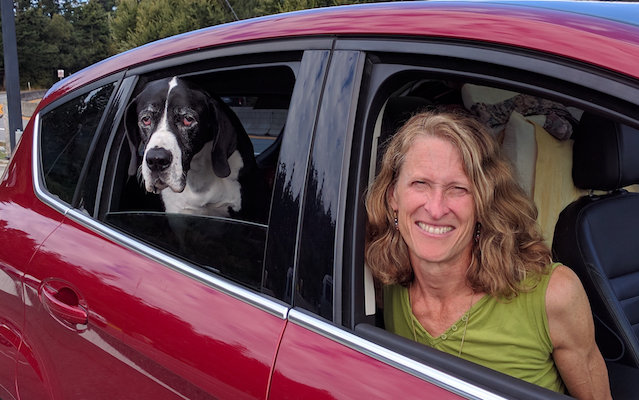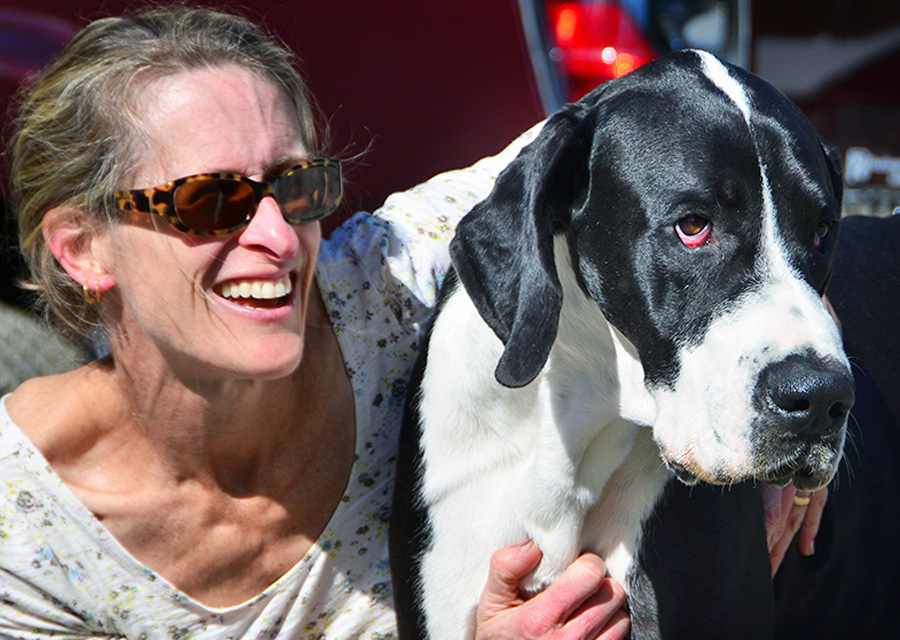
To mark National Pet Awareness Month, we talk to four people about how pets have impacted their experience of Parkinson’s, from boosting their mental wellbeing to providing them with “unconditional” love – and why taking on a furry companion needs to be a “thoughtful decision”
Did you have pets before or after you were diagnosed with Parkinson’s?
Leslie Davidson, Canada: I was diagnosed with Parkinson’s in 2011. Our family cat had died before my diagnosis, so my husband and I decided not to replace her at the time because we were retired and travelling a lot. Now, I have a Ragdoll cat named Pearl. I brought her home as a tiny kitten in November 2022.
Wytze Russchen, Spain: I have a mixed-breed puppy called Foxy, whom I adopted one year ago and who lives with my boyfriend and me. I was diagnosed in 2008 when I was 37. I didn’t have any pets at that time; though the moment I was forced to stop working in 2016, I bought a puppy called Boni, whom I had for over five years, but who unfortunately passed away in December 2021.
Clare Addison, UK: My husband and I have a 12-year-old cat and a miniature labradoodle who is now seven years old. I received my diagnosis in 2016. We got our dog around that time, but that decision was made more because my children wanted one. As a couple, we’ve always had pets. We previously owned a hamster and two other cats who lived for 17 years.
Peter Schielzeth, Germany: Together, my husband and I have a nine-year-old Dalmatian called Basti, whom we’ve had for over eight years. I found out I had Parkinson’s in 2014. At that time, we didn’t have a dog, as our previous one had passed away a year before.

Has Parkinson’s affected your ability to look after your pet?
Leslie: I don’t feel it has, but I think that’s because I opted for a cat. I love dogs, but I knew I wouldn’t always be able to give a dog the exercise it needed. That said, I have younger, healthier friends and family who say they will look after Pearl should the need arise.
Clare: It has occasionally, so for that reason, I’m glad I share responsibility in case I’m having a bad day.
Wytze: ‘Thanks’ to Parkinson’s, I have time to look after my dog. Before my diagnosis, I was working so hard that I wouldn’t have had the time to care for a pet. Luckily, I can still take care of Foxy myself, although sometimes I wish I could walk longer and faster with him – fortunately, my boyfriend and I can share the daily walks. I promised my dog and myself that if I have a bad day, I will never project my frustration onto him.

How does having a pet impact your wellbeing?
Clare: Generally, it’s a huge positive. Our cat is a cuddly comfort; she’s quietly loving, inquisitive and soft, and she calms the whole household. Our dog is a bundle of fun and cheekiness, who drags you out for a walk even if you’re not keen, which is great for me – but she’s equally happy to sit around on a cold, rainy day.
Leslie: My cat is constant entertainment, and it’s lovely to be greeted when I walk in the door. I find nothing more soothing than a purring cat on my lap, a cup of tea nearby and a good book in hand.
Peter: Basti is just there for me unconditionally. He is my best fitness motivator and keeps me moving, regardless of my mood or the weather. He is there when I need a friend or someone to cuddle. He makes me laugh and take responsibility for our mutual wellbeing.
Wytze: Physically, Foxy makes me walk 15,000 steps a day. If I feel down or stuck because of Parkinson’s, he licks me, cheers me up and forces me to go out and move – which of course is very important in my fight against Parkinson’s. There have been moments he’s saved my life just by being there. The unconditionality of his affection is extraordinary.

Do you encourage people with Parkinson’s to have pets?
Clare: A dog is great if you’ve got a busy household and the care doesn’t totally fall on you. I wouldn’t be without our dog, as I’ve grown to love her, and she’s part of our family. But I feel it’s very important that dogs are well trained, not too noisy and respond reliably when called. The cats are easy and live alongside us without being too demanding. A pet share is also a great option, as is borrowing an animal for a short time, because you get the benefit of the fun but less of the commitment and cost.
Wytze: If you are able to take care of the pet, yes, I strongly recommend it. It gives you purpose and a reason to wake up and go out. However, you own a pet for the rest of its life, so make sure you have support and assistance from others when you need help with your Parkinson’s.
Peter: Yes, but be considerate of what pet you choose. There’s nothing worse than having to separate from your pet because you can’t manage it. It’s important to think ahead, as this is a commitment that will likely last for over 10 years. For example, if you have trouble walking, a cat might be less demanding. If you’re struggling with ‘off’ periods or other Parkinson’s symptoms, make sure to set up an arrangement with somebody that can help look after your pet.
Leslie: It has to be a very thoughtful decision that considers the needs of the animal. For example, I no longer keep my pills on my night table but in the drawer – accidental poisoning never occurred to me until I spilled pills in Pearl’s presence, and she bounced over to check them out. But I think caring for a pet can shift our focus off of ourselves and our Parkinson’s. As long as we’re able to care for them, I think pets enhance our quality of life.

Lead image: Peter Schielzeth (right) his husband Daniel, and their dog Basti.


